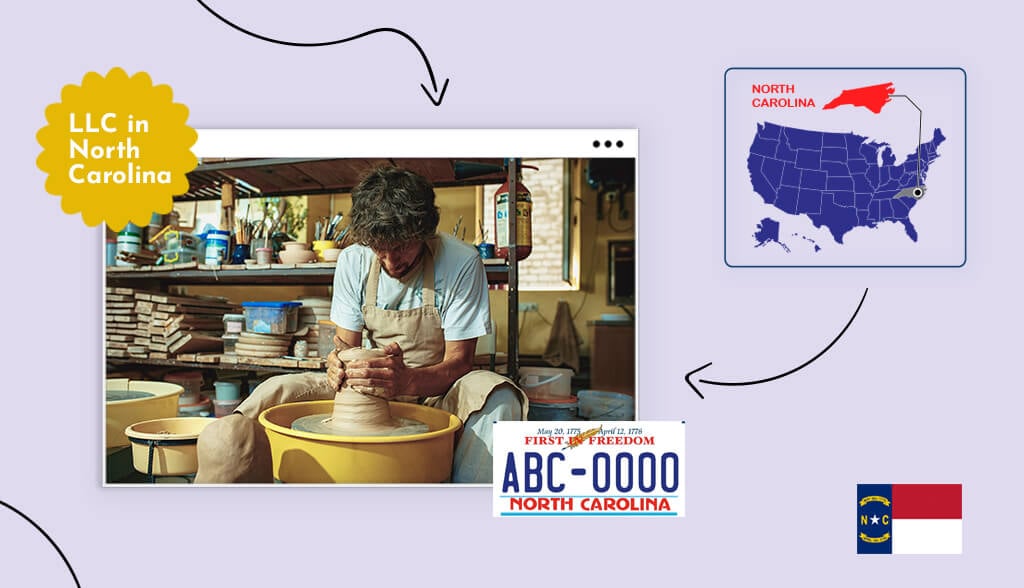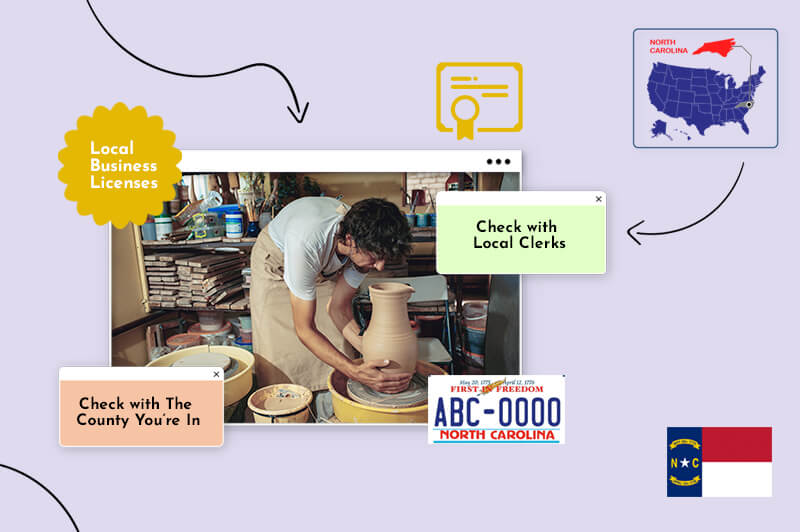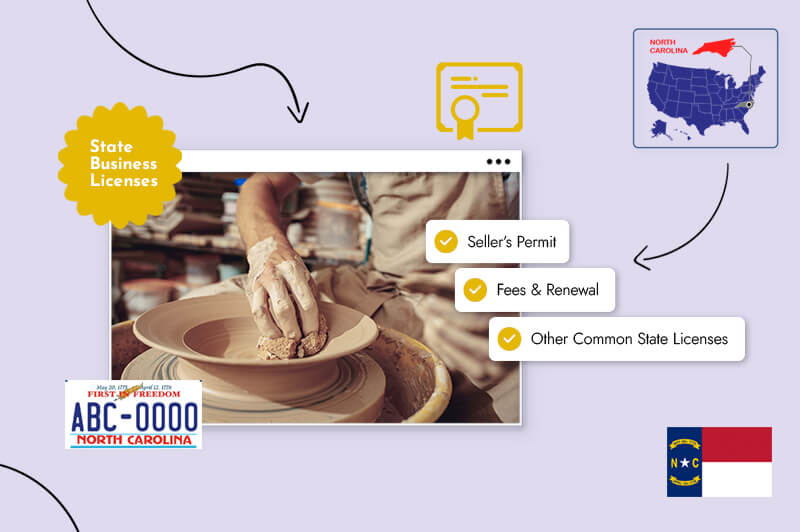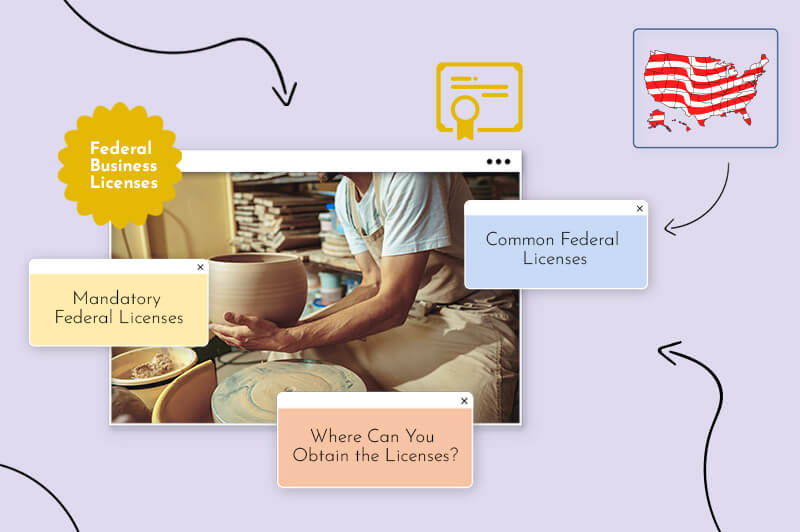
North Carolina doesn’t require you to have a general state business license for your LLC. However, if you’re starting a business in North Carolina you may need more specialized state licenses or permits if you engage in certain types of businesses. You may also need local licenses or permits for your business from your county, city, town, or village and, in some cases, federal licenses and permits as well.
A business license gives you the right to conduct business within a certain location. You may need one or more business licenses to operate your business in North Carolina.
However, in North Carolina, the state does not have a single business license that all businesses must obtain. Instead, whether you need a business license will depend on your location, occupation, and your business’s nature. Some North Carolina LLCs will need more than one business license, while others won’t need any.
If you engage in certain industries, for example, broadcasting, you may also need to get a license from the federal government.
In addition to licenses, you may also need permits to operate your business. In North Carolina, you may be required to get environmental permits for your business to show you are in compliance with local zoning regulations. Whether you need any permits and which you may need depends on your location and the type of business you are operating.
Certain types of businesses, for example, commercial fishing or running a restaurant that sells alcoholic drinks, will also need federal licenses in addition to any required by the state or your local government.
North Carolina issues almost 950 types of business and occupational licenses and permits. Cities, counties, and towns also may require licenses and/or permits.
To find out what licenses and permits you need and how to register for them, you can:
If you operate your business without getting the required licenses and permits, you may have to pay fines or fees. Your business could also be suspended or shut down. In some cases, you might be charged with a misdemeanor.

Although North Carolina does not require you to get a state-issued general business license, you may have to get one from your city, town, or village. Check with your municipal clerk or your city’s website for more information on how to obtain a local general business license. You can also call an EDPNC small business advisor for help at (800) 228-8443.
Every county, city, town, or village has its own requirements for licenses and permits. For example, Greensboro, North Carolina, requires:
Your county’s clerk can help you find out what county licenses or permits you may need. You can find their contact information in the Directory of North Carolina County Clerks.

In North Carolina, the Seller’s permit is called the “Certificate of Registration.” You need to submit the Certificate of Registration to receive a Sales and Use Tax Number that you will use when you make tax payments to the state.
You must get a Certificate of Registration from the North Carolina Department of Revenue if your business does any of these:
You can obtain a North Carolina Certificate of Registration online or by mail. When you apply for the certificate, you’ll need to include:
To register online, go to the North Carolina Department of Revenue’s registration page.
To register by mail:
After the Department of Revenue processes your application, it will assign you a Sales and Use Tax Number. You must use this number whenever you make your tax payments.
There is no fee to apply for the North Carolina Certificate of Registration, and it does not need to be renewed.
You should always check to see if your type of business needs a state license. Some businesses that require licenses may surprise you. For example, you’ll need to pay $300 for a North Carolina license if you run beach bingo games or $400 if you allow patrons to bring alcohol onto the premises of a community theater. More common state licenses include professional licenses, such as those for lawyers and healthcare providers.

Yes. The federal government regulates certain types of businesses. If you are engaged in a federally regulated business, you’ll probably have to get a federal license for your LLC.
To obtain a federal license, apply to the relevant agency. For example, the U.S. Department of Agriculture issues permits for agriculture-related business activities, and the Federal Aviation Administration handles licenses and certificates for pilots, aircraft, and airports.
The requirements for applying for a license depend on the type of license you are seeking. Some licenses are free. Others may have an application fee and an annual renewal fee.
When you apply, you’ll have to provide information about your business, which may include:
It’s important that you apply for all the required federal, state, and local licenses and permits. There are a huge number of licenses and permits available, so figuring out which you need to get and what you have to do to apply may understandably feel overwhelming.
Luckily, North Carolina provides help for small business owners, including access to free small business advisors. You could also consult your own financial, legal, or business advisors or contact your County or Municipal Clerk. However you do it, you will be one big step closer to completing all the requirements needed to get your new business off to a great start.
This portion of our website is for informational or educational purposes only. Tailor Brands is not a law firm, and the information on this website does not constitute legal advice. All statements, opinions, recommendations, and conclusions are solely the expression of the author and provided on an as-is basis. Accordingly, Tailor Brands is not responsible for the information and/or its accuracy or completeness. It also does not indicate any affiliation between Tailor Brands and any other brands, services or logos on this page.
Products
Resources
©2025 Copyright Tailor Brands